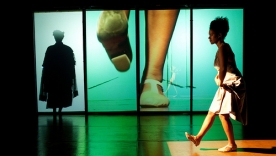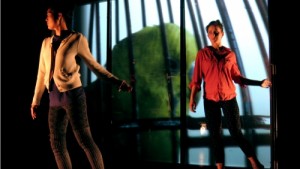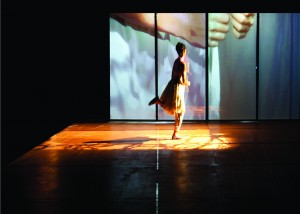STAGE MERGES WITH CINEMA
Soul Leaves Her Body starts with the three principal actors walking toward us one by one, slowly, as if through a mist. As they do this, smooth white video plays behind them, populated by large figures that imitate like they are looming shadows, revealing the actors’ true selves. Our plain-clothed black, white and Asian players are shown to actually be traditionally-dressed figures from 13th-century China; and while on video these people are trapped in a strict, societal drama, out on stage they break free and emote the turmoil of honor codes, ritual, and love through dance. It’s all beautifully staged, and has the poetry that the HERE Arts Center maintains so well in many of its pieces, but the problem here is that the engrossing, enigmatic tone of the beginning comes with a price—the mist never lifts.
While dance, especially as an introduction, can afford to be impenetrable, it’s actually the opposite that happens here. The dance is the original story this show draws its inspiration from and makes complete, almost tedious sense, while the second part of Soul is simply a cinematic film, and the third part a dialogue, and both of these more straightforward forms actually end up the most abstract. There’s something magical about this triumvirate—dance, film, play, and the collaboration should get credit for all being of similar quality, in terms of formal elements. Co-directors Peter Flaherty and Jennie MaryTai Liu, along with co-writer Xu Xi all have equally impressive resumes and all succeed in their respective fields here, creating enough wonderful dance choreography, compelling theatrical moments, and gorgeous cinematography in order to ostensibly be worth the price of admission. But where these creators succeed together, they must fail together.
Besides its title and its program’s claim, there is nothing that really explains how the last two parts connect with the first—except Liu, who appears in all three, and is effective, but lacks magic powers. They all have a little something to do with loss and sadness—they include typical Asian signposts like betrothal and Mah-jong, but depression and culturalism as through-lines don’t work for Alejandro Inarritu films and it doesn’t work here. The delicate balance between the three is also disturbed by the fact that the last two flow directly into each other. As Liu rings a doorbell at the end of the film, the screen lifts and she walks through the door onto the last scene, forming a whole between them. Are the last two segments the story at hand, and the dance simply the tone-setter? This might work if it wasn’t for how long it was, and the memorable performance of Sean Donovan and time put into his character in the “Ancient Story.” It could be that this is intentional: he is part of the loss Liu is mourning in all of her incarnations, but there needed to be more interactions and doppelgangers at play if we are to connect the present with the past without just grabbing at the shadows we are shown.
Dramatization of the West and Western themes are always a tall order, and patch-working together a traditional story with something contemporary within that would demand a passionate message altogether absent in Soul Leaves Her Body. Flaherty and company like to play in that world, and have the skills and chutzpah to do so, but don’t have anything much to communicate. It’s a nice exploration, but with nothing found except competency.
photos by Ray Sun
Soul Leaves Her Body
HERE Arts Center’s Mainstage Theatre
ends on November 23, 2010
for tickets, call 212.352.3101 or visit HERE




